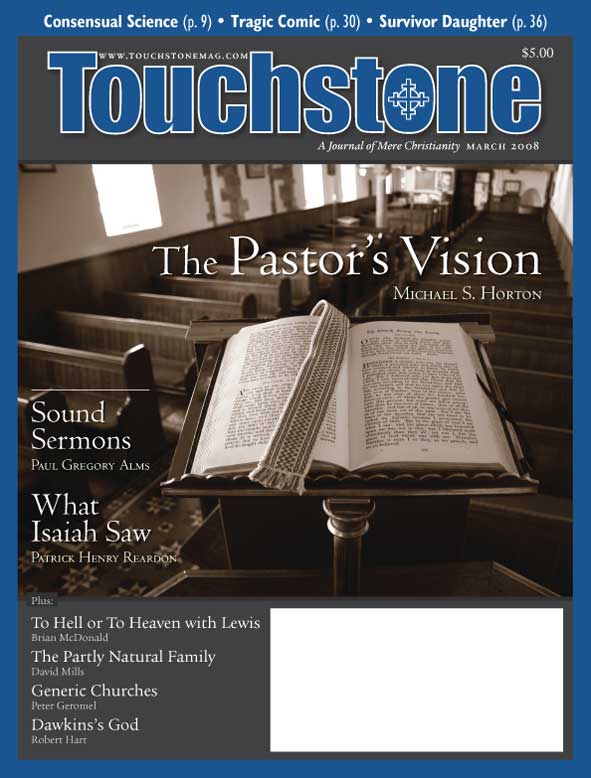Feature
Merely Saved or Merely Damned?
C. S. Lewis Dramatizes the Heart’s Critical Choice
Years ago, my eldest daughter emerged from her room, where she’d been sent for bad behavior, and tearfully handed me a crayon drawing. At the bottom of the page she’d colored in a row of black hearts and crossed out every one. In the middle of the page she had sketched a little stick figure bowing before a crudely drawn cross; from the cross brightly colored yellow arrows pointed upward to a row of red and shiny hearts. As I stared astonished at her startlingly clear iconograph of sin, redemption, and repentance, she threw her arms around me and sobbed, “I want red hearts, not the black hearts.”
Often since that wonderful moment, it has seemed to me that the Spirit of God, who promised Ezekiel, “I will take away the heart of stone and give them a heart of flesh,” had done exactly that in my little daughter, awakening her imagination through bright and powerful imagery that cleared out the fog of childish passion and filled her mind and heart with clarifying light, revealing the stark choice between darkness and light, sinfulness and grace.
I do not know if I have ever experienced a repentance as pure and innocent as my daughter’s, but I have on many occasions known something of that experience in which an awakened imagination illumines the heart and mind—most often while reading or recalling the works of C. S. Lewis. And I am convinced that in an era when the darkness of postmodern confusion lies thickly across the path to the Heavenly City, Lewis’s imaginative and redemptive clarity are more necessary than ever.
This clarity shines particularly brightly in The Screwtape Letters and The Great Divorce, each of which combines Lewis’s two greatest strengths: the apologist’s ability for lucid exposition and the storyteller’s knack for spinning an engaging tale. In these two books, Lewis has cleverly established a premise and a plot whose very nature requires a major character to explain the significance of the events that take place in them. The perils of temptation and the joys of salvation are both dramatized and analyzed, providing the reader with a double vision in which the imagination and the intellect are simultaneously illumined.
Two Kinds of Misdirection
In The Screwtape Letters Lewis creates this stereopsis by presenting the human condition as it appears to one Screwtape, a prominent member of hell’s “lowerarchy.” Through a series of letters to his nephew, a novice tempter named Wormwood, Screwtape shows us the hell’s eye view of how to keep humans from getting to heaven.
The tactics he recommends for Wormwood’s human “patient,” are as complex and varied as their principle is simple: “Aggravate that most useful human characteristic, the horror and neglect of the obvious.” The successful tempter is one who promotes that neglect through continual distraction and misdirection.
This strategy of damnable distraction takes on two opposite forms, which I have labeled “misdirection inward” and “misdirection outward.” Misdirection inward aims at making the patient substitute imagination and feeling for fact and will. Misdirection outward seeks to substitute the opinions of a smart set for the patient’s own understanding while also getting him to evaluate the conventional wisdom of the day on the basis of its appeal and not its truth.
Screwtape lays out the strategy of misdirection inward soon after the patient has undergone the catastrophe (from hell’s viewpoint) of a Christian conversion. To retrieve him, Screwtape proposes that Wormwood divert the man’s attention from outward behavior to inward feelings; this will divert the young Christian’s attention from the way his newfound faith might require a change in his dealings with his mother (with whom he lives):
Keep his mind on the inner life. He thinks his conversion is something inside him and his attention is therefore chiefly turned at present to the states of his own mind. . . . Encourage this. Keep his mind off the most elementary duties by directing it to the most advanced and spiritual ones. . . . You must bring him to a condition in which he can practice self-examination for an hour without discovering any of those facts about himself which are perfectly clear to anyone who has ever lived in the same house with him or worked in the same office.
subscription options
Order
Print/Online Subscription

Get six issues (one year) of Touchstone PLUS full online access including pdf downloads for only $39.95. That's only $3.34 per month!
Order
Online Only
Subscription

Get a one-year full-access subscription to the Touchstone online archives for only $19.95. That's only $1.66 per month!
bulk subscriptions
Order Touchstone subscriptions in bulk and save $10 per sub! Each subscription includes 6 issues of Touchstone plus full online access to touchstonemag.com—including archives, videos, and pdf downloads of recent issues for only $29.95 each! Great for churches or study groups.
Transactions will be processed on a secure server.
more on C. S. Lewis from the online archives
more from the online archives
calling all readers
Please Donate
"There are magazines worth reading but few worth saving . . . Touchstone is just such a magazine."
—Alice von Hildebrand
"Here we do not concede one square millimeter of territory to falsehood, folly, contemporary sentimentality, or fashion. We speak the truth, and let God be our judge. . . . Touchstone is the one committedly Christian conservative journal."
—Anthony Esolen, Touchstone senior editor













